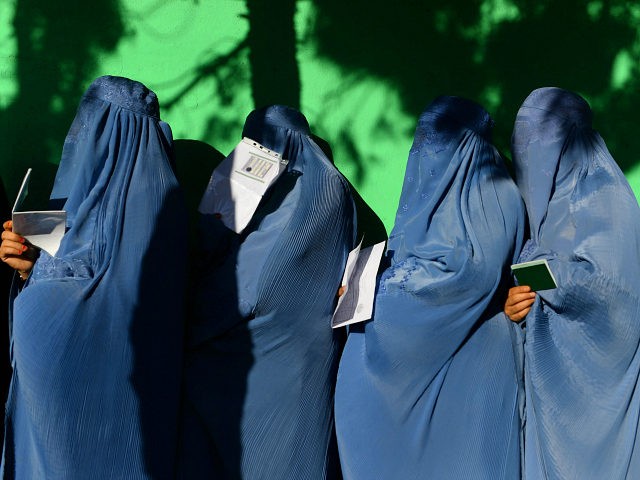An Afghan Taliban spokesman on Tuesday repudiated a news report claiming the group is planning to include women in its delegation expected to continue negotiations with the United States this month to end the more than 17-year-old war, claiming that the media outlet “misconstrued” his remarks.
On Wednesday, Reuters reported that Zabihullah Mujahid, a spokesman for the jihadi group, indicated that “women will be included for the first time in the Taliban delegation to peace talks in Qatar this month.”
The report came a day after the state-owned Xinhua news outlet from China, Afghanistan’s neighbor, suggested that the terrorist group is suspected of bombing two girl’s schools in the war-ravaged country in recent days — on Monday and Sunday.
“For a group notorious for its strictly conservative attitude to women’s rights, the move represents a step towards addressing demands that women be included in the talks, intended to lay the foundations for a future peace settlement,” Reuters noted.
“There will be women among Taliban delegation members in the Doha, Qatar, meeting,” Mujahid allegedly told Reuters via a telephone call.
Without naming the women, he added, “These women have no family relationship with the senior members of the Taliban, they are normal Afghans, from inside and outside the country, who have been supporters and part of the struggle of the Islamic Emirate [Taliban].”
Soon after the Reuters article came to light, Mujahid dismissed it as fake news.
The spokesman wrote on Twitter:
My correspondence with @Reuters is misconstrued. I said that women will partake in the upcoming intra-Afghan conference, just like those in Moscow. We said nothing relating to women in negotiation team & neither do we believe it is necessary.
#Clarification
My correspondence with @Reuters is misconstrued.
I said that women will partake in the upcoming intra-Afghan conference, just like those in Moscow.
We said nothing relating to women in negotiation team & neither do we believe it is necessary.
– Mujahid— Zabihullah (ذبیح الله م ) (@Zabihullah_4) April 15, 2019
On Wednesday, Xinhua suggested the Taliban may be behind the recent attack on two girls’ schools in western Afghanistan’s Farah province, which shares a border with the group’s ally Iran.
Although no specific group claimed responsibility for the attack, Xinhua noted, “Taliban militants have in the past been blamed for such incidents as they oppose girls’ education.”
After a brief hiatus, the U.S. and the Taliban are reportedly expected to resume negotiations during an April 19-21 meeting in the Qatari capital of Doha, home to the group’s political office.
The Taliban’s refusal to allow Kabul to participate in the talks has surfaced as the top point of contention between negotiators. Nevertheless, Reuters noted that the upcoming negotiations would include a delegation “comprising prominent Afghans, including opposition politicians and civil society activists.”
“The non-Taliban delegation that was in Moscow [in February] could be expanded next week to include some government officials, but acting in their private capacities as the insurgents have refused to hold formal talks with Kabul,” it adds.
The Taliban, which is fighting to establish an Islamic State in Afghanistan, considers itself the only legitimate government in the country, dismissing Kabul as an American “puppet.”
Under President Donald Trump, the United States has deemed the negotiated political reconciliation between Kabul and the Taliban — which may allow the group to return to power — the top priority of its strategy to end the conflict.
The Taliban has intensified attacks against U.S. troops as well as Afghan security forces and civilians amid the ongoing peace negotiations, particularly after launching its spring offensive, dubbed “Victory,” last Friday.
However, the Afghan National Defense and Security Forces (ANDSF) continue to show a willingness to take on the terrorist group, killing an estimated 200 Taliban jihadis in less than a week since the offensive began.
Under U.S. President Donald Trump, the United States has boosted its peace-seeking efforts to end the ongoing war — raging since October 2001.
So far, negotiations have produced a draft agreement — the eventual withdrawal of U.S.-led international forces in exchange for counterterrorism assurances from the Taliban.
The terrorist group has rejected the Trump administration’s proposal to leave behind a residual force to ensure it keeps its promises, demanding that the foreign troops leave within months.
Taliban terrorists claim they will only talk to Kabul after the departure of all U.S.-NATO troops.

COMMENTS
Please let us know if you're having issues with commenting.